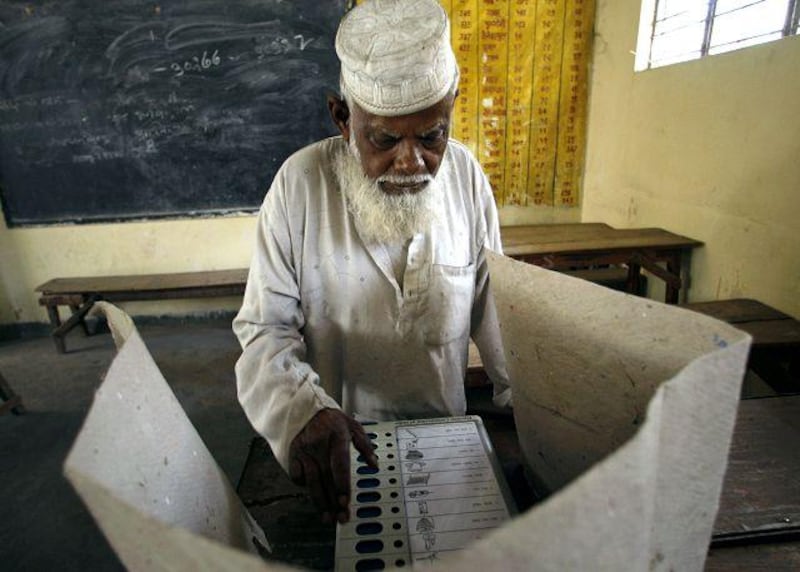KOLKATA // India's minority Muslims are hoping that the newly elected government will make good on pledges to improve their lives, after it was acknowledged that their community was instrumental in its election victory. Shortly after the first batch of ministers were sworn in last month, the prime minister's office asked the minorities welfare ministry for a detailed plan of action to help minorities, along with a status report on other ongoing minority development schemes.
"The prime minister appears very serious on this issue this time and we are surprised at [his office's] keenness in minority welfare," an unnamed source in the prime minister's office told the Sangbad Pratidin newspaper. Zafarul Islam Khan, the president of the All India Muslim Majlis-e Mushawarat, the umbrella body of major Indian Muslim organisations, said barring a few states such as Assam, in most parts of the country, Muslims voted for the Congress-led UPA coalition, hoping it would address some Muslim grievances. "Muslims believe that the UPA this time will make sincere efforts to at least implement the recommendations by the Sachar Committee and Ranganath Mishra Commission," said Mr Khan.
The Sachar Committee, initiated by Congress and tabled in parliament in 2006, reported that Muslims in India were as disadvantaged as low caste Hindus. In 2007, the Ranganath Mishra Commission reported that a high rate of unemployment and lack of education had led to a decline in Muslims' socio-economic standards, and recommended that 10 per cent of jobs in government services and seats in educational institutions be set aside for the community.
The prime minister's office subsequently prepared a 15-point development plan for the educational development of minorities and the human resources development ministry was asked to implement the programme. However, a few days before the results of the general election were announced last month, the human resources ministry said the plan lagged far behind target, putting its achievement rate at 31 per cent.
But the government's attitude seems to be changing. Just two hours after taking over the human resources ministry, Kapil Sibal asked his employees to prepare a road map for the implementation of key initiatives promised to minorities. According to a source in the prime minister's office speaking to the Telegraph newspaper, the recommendations the ministry has lined up include the opening of five universities and 4,000 primary schools in areas where there is a large Muslim population, opening of special departments to promote skills development, target-orientated training for emerging industry jobs and more merit-cum-means scholarships.
While many Muslims are hopeful the government will make efforts to improve their lives, some community leaders are sceptical it can deliver on its promises. "The [government] is conscious of this fact that Hindu nationalists would get angry if Muslims were extended aid in so many ways. This is a Hindu-majority country. "Fearing alienation of a sizeable section of Hindu voters and resistance from Hindu nationalist groups, the government will possibly not go out to fulfil all that it has promised to Muslims," said Mr Khan.
When the prime minister's 15-point programme was approved in 2006, the Hindu nationalist BJP party opposed it, calling it "communal budgeting" and a ploy to divide society on religious lines. Some BJP leaders also charged that the coalition was indulging in "vote-bank politics", by "appeasing" the minority. Mr Khan said it was no longer a case of simply minority demands, but that an act that would benefit the entire country.
"It's a government-instituted commission which has recommended the reservation for Muslims as a logical step to help the community come out of their backwardness, which is in the nation's interest. If the government does not implement this [Ranganath Mishra] commission's recommendation it will be tantamount to denial of justice to Muslims," said Mr Khan. This week, Salman Khurshid - the country's minority welfare minister and a senior Congress leader, said quotas were a "double-edged sword" which could create "envy, hostility and resistance" and advocated affirmative action which he said would encourage competition rather than make Muslims dependent on aid.
"Why should we just follow a standard line of quotas? There may be a better way. If there isn't, then, we will come back to discussing quotas. Let us look at other angles," Mr Khurshid told the Indian Express. Jawed Shaikh, an engineering college professor and president of Rashtriya Muslim Bahujan Parishad - an organisation fighting for underprivileged communities in Nagpur - said Mr Khurshid's views suggested the government might not opt for quotas for Muslims.
Quotas had been introduced for other underprivileged groups, including low castes and tribes and "backward communities", and they worked, he said. "So, why in the case of Muslims, does Mr Khurshid think that quotas could not be a solution?" he said. "I think, the government is not in a mood to implement the Ranganath Mishra Commission recommendations. If finally that remains the case, Muslims will feel betrayed by the government."
Syed Mohammad Noorur Rahman Barkati, a well-known cleric based in Kolkata who urged Muslims to vote for Congress and its allies, said the government would be making a mistake if it ignored the Muslim community again. "After a gap of two decades Muslims have reinstated their faith in Congress. Now it's up to the party to fulfil its promises for the development of the community," Maolana Barkati said.
"If the [Congress-led] government takes Muslims for granted again and fails to deliver on its promises to the community, Muslims will decide to throw Congress out of power in the next general elections." aziz@thenational.ae





